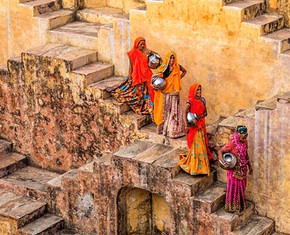The views expressed in our content reflect individual perspectives and do not represent the authoritative views of the Baha'i Faith.
Material progress insures the happiness of the human world. Spiritual progress insures the happiness and eternal continuance of the soul. – Abdu’l-Baha, Foundations of World Unity, p. 85.
In this age of spiritual awakening, the world has entered upon the path of progress into the arena of development, where the power of the spirit surpasses that of the body. Soon the spirit will have dominion over the world of humanity. – Abdu’l-Baha, Abdu’l-Baha in London, p. 81.
The Baha’i teachings say that we now live in an age of spiritual awakening, an era that offers us “a path of progress into the arena of development.”
That kind of spiritual progress, Baha’is believe, has to happen to balance the unsustainable material progress we’ve made as a species. The historian, author and cultural critic Kirkpatrick Sale says such solely material progress produces a condition he famously called affluenza, which manifests the symptoms of “heart disease, stress, overwork, family dysfunction, alcoholism, insecurity, anomie, psychosis, loneliness, impotence, alienation, consumerism, and coldness of heart.” These negative symptoms of material “progress,” the Baha’i teachings say, can only correct themselves with a balance of moral and spiritual progress, which combines with material civilization to produce true progress:
All this is the outcome of material civilization; therefore, although material advancement furthers good purposes in life, at the same time it serves evil ends. The divine civilization is good because it cultivates morals. Consider what the Prophets of God have contributed to human morality. Jesus Christ summoned all to the Most Great Peace through the acquisition of pure morals. If the moral precepts and foundations of divine civilization become united with the material advancement of man, there is no doubt that the happiness of the human world will be attained and that from every direction the glad tidings of peace upon earth will be announced. Then humankind will achieve extraordinary progress, the sphere of human intelligence will be immeasurably enlarged, wonderful inventions will appear, and the spirit of God will reveal itself; all men will consort in joy and fragrance, and eternal life will be conferred upon the children of the Kingdom. Then will the power of the divine make itself effective and the breath of the Holy Spirit penetrate the essence of all things. Therefore, the material and the divine, or merciful, civilizations must progress together until the highest aspirations and desires of humanity shall become realized. – Abdu’l-Baha, The Promulgation of Universal Peace, pp. 109-110.
For such a profound societal transformation to happen, we must create a worldwide civilization, a universal system that offers every human being the individual rights and freedoms they deserve.
The Baha’i teachings enumerate those rights and freedoms at length. We all have the right to live in a world free of war. We all have the right to live in a world where prejudice and racism have been consigned to the rubbish heap of obsolete doctrines. We all have the right to an education. We all have the right to practice our beliefs as we see fit. We all have the right to gender equality. We all have the right to a world free of the extremes of wealth and poverty. We all have a right to equal justice under the law. We all have a right to prosper and progress. From a Baha’i perspective, those rights grow out of a new, spiritualized global consciousness that centers on the oneness of humanity:
…in this age of splendours, teachings once limited to the few are made available to all, that the mercy of the Lord may embrace both east and west, that the oneness of the world of humanity may appear in its full beauty, and that the dazzling rays of reality may flood the realm of the mind with light. – Abdu’l-Baha, Selections from the Writings of Abdu’l-Baha, p. 59.
One of the primary, definitive signs of progress toward the oneness of humanity, the Baha’i teachings say, involves the basic freedom to think and say what you think:
Freedom of thought and speech enlarges the circle of one’s understanding and leads to progress and unity. – Abdu’l-Baha, Star of the West, Volume 1, p. 5.
The Baha’i teachings recognize that the citizens of most modern democracies enjoy freedom of thought and speech, but those who live under despotic regimes, whether political or religious, often do not. In fact, Baha’is believe that the freedom of thought and speech are essential to any culture’s underlying growth and development:
Consider what a vast difference exists between modern democracy and the old forms of despotism. Under an autocratic government the opinions of men are not free, and development is stifled, whereas in democracy, because thought and speech are not restricted, the greatest progress is witnessed. It is likewise true in the world of religion. When freedom of conscience, liberty of thought and right of speech prevail — that is to say, when every man according to his own idealization may give expression to his beliefs — development and growth are inevitable. – Abdu’l-Baha, The Promulgation of Universal Peace, p. 197.
That elemental human freedom to believe as each person sees fit and to express those beliefs openly, the Baha’i teachings suggest, has become an absolute necessity, a prerequisite for progress:
Interference with creed and faith in every country causes manifest detriment, while justice and equal dealing towards all peoples on the face of the earth are the means whereby progress is effected. – Abdu’l-Baha, A Traveller’s Narrative, p. 87.
For Baha’is, freedom of expression represents one of the central pillars of a modern civilization, absolutely essential to the growth of any human endeavor.
















Comments
Sign in or create an account
Continue with Googleor